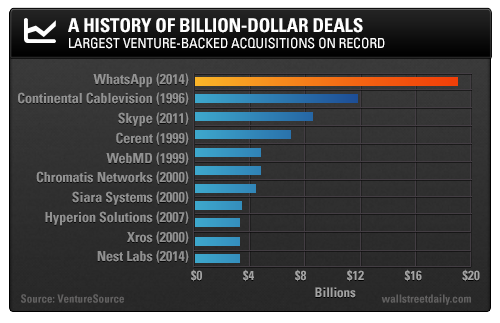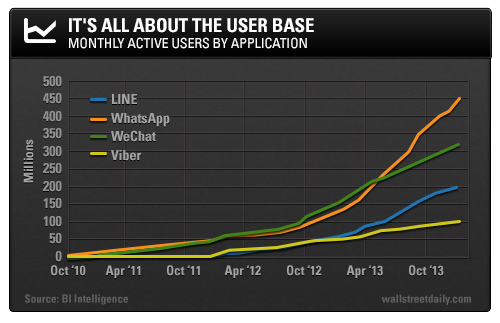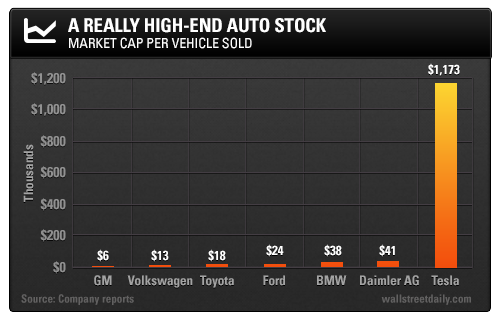“Markets can remain irrational a lot longer than you and I can remain solvent.”
So said John Maynard Keynes, the famous British economist. And right now, irrationality certainly reigns in Silicon Valley.
So much so, in fact, that I’m officially renaming it “Silly Valley.” Because that’s the only way to characterize the valuations being paid.
In this week’s Friday Charts edition, I’m going to prove just how downright silly it’s gotten.
Prepare to be stupefied…
Nineteen. Billion. Dollars.
That’s an amount equal to the entire economy of Nicaragua, seven and a half Mark Cubans, roughly one-third of the market cap of leading automaker, Ford Motor (F)… and now, what Facebook (FB) is paying for text messaging service, WhatsApp.
Yes, a text messaging company, with only 55 employees, just fetched a $19-billion takeover offer. That works out to $345 million per employee.
It has to be a mistake, right? The biggest clerical error in history? An accidental extra digit in the offer sheet?
Nope! Fact is, the deal represents the largest venture-backed takeover in Silicon Valley. Ever.

Utter absurdity! So what is Facebook’s hoodie-wearing head honcho, Mark Zuckerberg, thinking?
Well, he knows long-term success in the social media world is all about engagement. Lose it and the next stop is the plot beside MySpace in the internet graveyard.
And WhatsApp definitely boasts engaged users. Way more than all the other fledging, social media startups. Take a look:

Even with 450 million active monthly users, though, the purchase price doesn’t jive with reality.
Consider: When Facebook acquired photo-sharing startup, Instagram, for $1 billion, it paid roughly $30 per user. Now, less than two years later, the company is paying $42 per user, or 40% more, for WhatsApp. That’s a hefty increase in such a short period of time.
The price tag becomes all the more absurd when you realize WhatsApp’s monetization strategy involves charging users a measly $1 per year after a year of free use.
Mind you, these are users who rely on WhatsApp to bypass charges from mobile phone companies to send text messages for free over the internet.
Now, paying $42 for the right to earn $1 doesn’t make any sense in a rational world. But paying that much for a bunch of freeloaders doesn’t make any sense – period.
Even Facebook executives can’t justify it.
When Jefferies’ analyst, Youssef Squali, asked how they came up with the purchase price, CFO David Ebersman said the primary thing was “how healthy this network is and how it’s growing.”
Funny. But I don’t see a formula in Excel that lets me take into account those variables to arrive at a valuation. Must be some newfangled math, practiced only in Silicon Valley, that’s going to be included in the next update.
The silly valuations in the valley don’t stop with Facebook, though. Tesla Motors (TSLA) is getting in on the action, too.
Too Far, Too Fast
I know it appears that I was completely wrong for taking a bearish stance toward Tesla on CNBC’s Closing Bell on December 16, 2013. (The stock is up 30% since then.)
But I stand by my conviction – a day of reckoning is inevitable. And the numbers prove it.
On the heels of its quarterly report this week, Tesla traded to a new all-time high of $215.12 per share, equal to a market cap of more than $26 billion.
Mind you, the company only sold 22,477 cars last year. If we do the math, that works out to $1.17 million in market cap per car sold.
I get that Tesla boasts gross margins that are 10% higher than Ford, for example. But that’s still way too much of a premium valuation.
Truth be told, at current levels, the stock’s not even trading in the same galaxy as every other major automaker. And remember, Tesla is still just a car manufacturer.

Naysayers will quip that it’s all about future growth. Oh yeah? If we take into account management’s estimates for up to 40,000 vehicle sales in 2014, the company is still valued at an absurd $654,000 per car.
Even if we assume that the company keeps increasing production at the same breakneck pace, it would take more than five years to grow into its current valuation and trade at a level on par with other premium automakers like BMW and Mercedes Daimler AG.
Like I said, absurdity reigns in Silicon Valley. In situations like this, I’ve found it’s best to keep my hard-earned capital out of harm’s way.
